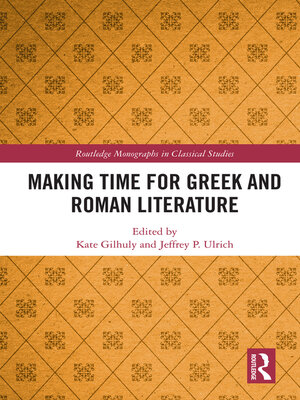Making Time for Greek and Roman Literature
ebook ∣ Routledge Monographs in Classical Studies
By Kate Gilhuly

Sign up to save your library
With an OverDrive account, you can save your favorite libraries for at-a-glance information about availability. Find out more about OverDrive accounts.
Find this title in Libby, the library reading app by OverDrive.



Search for a digital library with this title
Title found at these libraries:
| Library Name | Distance |
|---|---|
| Loading... |
The essays in this collection explore various various models of representing temporality in ancient Greek and Roman literature to elucidate how structures of time communicate meaning, as well as the way that the cultural impact of measured time is reflected in ancient texts.
This collection serves as a meditation on the different ways that cosmological and experiential time are construed, measured, and manipulated in Greek and Latin literature. It explores both the kinds of time deemed worthy of measurement, as well as time that escapes notice. Likewise, it interrogates how linear time and its representation become politicized and leveraged in the service of emerging and dominant power structures. These essays showcase various contemporary theoretical approaches to temporality in order to build bridges and expose chasms between ancient and modern ideologies of time. Some of the areas explored include the philosophical and social implications of time that is not measured, the insights and limitations provided by queer theory for an investigation of the way sex and gender relate to time, the relationship of time to power, the extent to which temporal discourses intersect with spatial constructs, and finally an exploration of experiences that exceed the boundaries of time.
Making Time for Greek and Roman Literature is of interest to scholars of time and temporality in the ancient world, as well as those working on time and temporality in English literature, comparative literature, history, sociology, and gender and sexuality. It is also suitable for those working on Greek and Roman literature and culture more broadly.







